
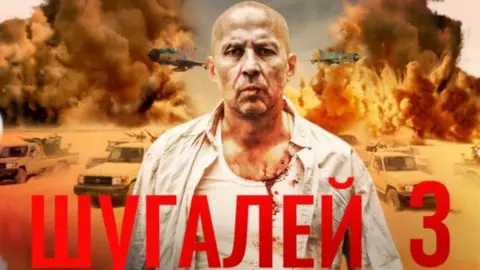 YouTube / Aurum Production
YouTube / Aurum Production
Maxim Shugalei is played by actor Kirill Polukhin (pictured) in the Shugalei film series, funded by the late Yevgeny Prigozhin
Dodging bullets, ducking explosions, safeguarding state secrets.
Bombastic propaganda films present the shadowy Russian political operative Maxim Shugalei as a heroic figure - who will apparently stop at nothing in his quest to promote the country abroad.
While his escapades have no doubt been exaggerated, in real life he has played a significant role in the expansion of Russia's influence in parts of Africa, working closely with the Wagner Group of Russian mercenaries.
However, this would-be iron man recently suffered a set-back when he was arrested in the central African nation of Chad.
He, along with fellow Russian operatives Samer Sueifan and E Tsaryov, were detained in September on unexplained charges, before being freed and sent home earlier this month, according to the Russian embassy.
Who is Maxim Shugalei?
Shugalei tends to describe himself as a "sociologist" but in reality, say analysts, he is a spin doctor and an agent of Russian influence known for his work on the African continent.
He has been under EU sanctions since 2023 for overseeing disinformation campaigns to promote the Wagner Group in several African countries, and is also the subject of Ukrainian sanctions.
Since at least 2010, Shugalei was affiliated with the late Russian businessman Yevgeny Prigozhin, the Wagner boss and a close associate of President Vladimir Putin.
While Shugalei used to deny these ties - as was customary in Prigozhin's circles - he nevertheless first came to media attention for his work and subsequent arrest in Libya on charges of spying and meddling in elections on behalf of the Wagner boss.
Prigozhin had tasked Shugalei with gathering information and preparing a strategy to support Seif al-Islam Gaddafi, the son of former leader Muammar Gaddafi.
When Shugalei returned to Russia, Prigozhin revealed that he had given him 18m rubles ($173,000; £138,000) – 1m rubles for each month he had spent in captivity.

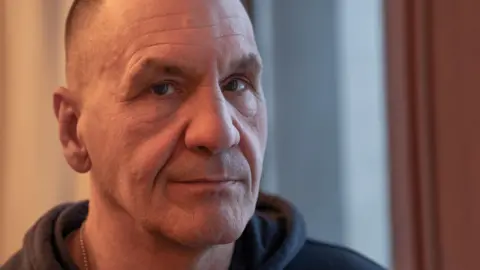 Getty Images
Getty Images
It is hard to know exactly how much influence Shugalei wields
Shugalei's escapades in Libya formed the basis for a trilogy of action TV films, seemingly sponsored by Prigozhin. They were designed to, among other things, glorify the regime of then-Wagner ally Khalifa Haftar in eastern Libya and whitewash Russia’s activities in Africa.
The role of Shugalei was played by the actor Kirill Polukhin, and the films show him as "almost a James Bond figure, or Mission Impossible type", says Ladd Serwat, an Africa Regional Specialist at the Armed Conflict Location and Event Data project (Acled).
"We are shown this macho, tough person who is unwilling to crack under pressure or give away national secrets – then is very capable as a mercenary or independent military operator."
A modest-sized online fan page falsely claims that "Shugalei" has even become an Arabic word for "man of iron who cannot be broken".
But as a key player in the expansion of Russia's influence in Africa in recent years, he has also been involved in some extraordinary activities in real life.
In 2018, a BBC investigation found that he was one of several Russian operatives who were caught offering suitcases full of cash to presidential candidates in Madagascar.
Before his activities abroad, the only public episode of Shugalei's career as a political consultant dates back to the 2002 elections for the St Petersburg parliament.
At the time, Shugalei served as a representative for one of the candidates and famously ate several documents during an electoral commission meeting to prevent them from being submitted to court.
How influential is Shugalei?
Under Prigozhin, Shugalei's official position was head of the Foundation for the Protection of National Values, a pro-Wagner organisation and public relations firm.
Unofficially, he worked in various African states to try to ensure regimes favourable to Wagner would come to, and remain in, power, as part of Russia's attempts to gain influence on the continent - especially at the expense of France.
Since the death of Yevgeny Prigozhin last year, troops serving under the Wagner banner in Ukraine and Africa have been absorbed into Russia's official military structure.
However, Prigozhin's media empire, which Shugalei was a part of, has crumbled.
As someone who operates in the shadows, it is hard to know exactly how much influence he wields.
Yet, according to some, Shugalei may not have lost too much influence despite the death of his mentor.
"He still seems to have the same level of influence, despite the fact that the Kremlin seems to have taken over the majority of Wagner group operations," says Beverly Ochieng, a senior analyst covering Francophone Africa for Control Risks.
He seemingly no longer denies his ties to Wagner and Prigozhin – his Telegram channel is full of posts commemorating the late oligarch and his mercenary group, and he even reposts Wagner’s recruitment information.
Yet, aside from his arrest in Chad and a July trip to Angola which he documented on Telegram, it is hard to tell the full scale of his current activities.

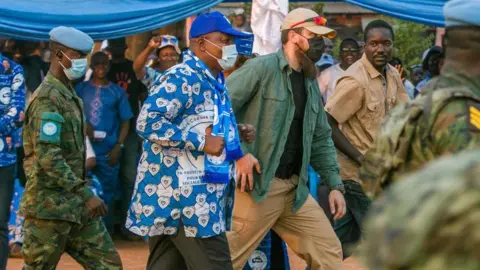 Getty Images
Getty Images
Suspected Wagner bodyguards were pictured on the campaign trail with Central African Republic's President Touadéra in 2020
Why was he arrested in Chad?
Chad has given no official reason for the arrest of Shugalei and his two associates.
Multiple theories abound – some more plausible than others.
Russian state-controlled news channel RT reported that the arrests were instigated by France, but this is most likely a fiction designed to save face, Ms Ochieng tells the BBC.
Since at least May, Russia has been pushing the narrative that the West's traditional influence in Chad is waning.
But, although Chad has recently signed deals with Russia on infrastructure and security, it still hosts French troops, and retains good relations with the former colonial power, unlike several of its Francophone neighbours which have tilted towards Russia.
There is no evidence of a Russian military presence in the country.
In fact, some argue that Chadian President Mahamat Déby is expertly playing Russia and the West against each other, to Chad's advantage.
Russia is striving to gain complete dominance over West Africa's Sahel region, and already has close ties to two of Chad's neighbours - Niger, and the Central Africa Republic (CAR), the country where Russia's influence is strongest on the continent.
Wagner fighters are said to have infiltrated Chad from the CAR and clashed with the local army, before retreating.
If Russia could bring Chad into its orbit, that would create an uninterrupted sphere of influence stretching thousands of miles.

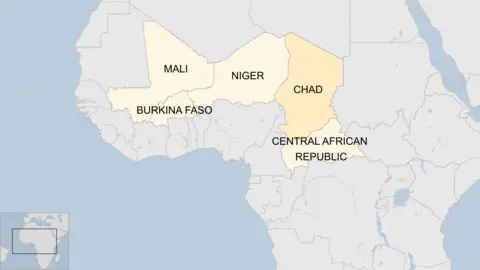
Mali, Burkina Faso, Niger and CAR already have close links with Russia
Shugalei had visited Chad twice before, and notably held talks with Déby's campaign team prior to the presidential elections in May. He was also linked to the Russia House cultural centre in the capital, N'Djamena, which recently unveiled a new headquarters at a ceremony attended by Russian government officials.
Last year, US intelligence services said they had discovered that Wagner allegedly orchestrated a plot to assassinate Déby but failed to carry it out.
Mr Serwat suggests this may be why Shugalei was arrested.
Ms Ochieng says Chad may have been worried about Shugalei's potential to try and destabilise the country by spreading disinformation.
Shugalei's foundation has denied that he is a "Wagner spy", saying Shugalei "does not know anything in particular about Wagner Group's activities in Africa and only knows general details about what it did previously".
Russian-backed social media content, TV stations and news sites are being deployed to spread a pro-Russian agenda and disinformation, especially in Africa, according to analysts.
Examples include Afrique Media TV which broadcasts from Cameroon as far afield as CAR, Ivory Coast, Mali, Burkina Faso, Niger - and is also on YouTube where it has thousands of followers, and enjoys a large Facebook following.
Shugalei himself teases his presence in various African countries, sometimes sharing short, low-budget, vlog-style Telegram videos that make clear his love of showmanship.
Of the video content aimed at Africans, many take on a fable-like appearance – one, called LionBear - shows a bear (which symbolises Russia) running across the globe to defend a lion (his Central African Republic friend) from the malign influence of hyenas.
"I don't think people necessarily are won over by these videos – people think it's funny, a joke," says Ms Ochieng.
You may also be interested in:

 Getty Images/BBC
Getty Images/BBC

 2 hours ago
1
2 hours ago
1

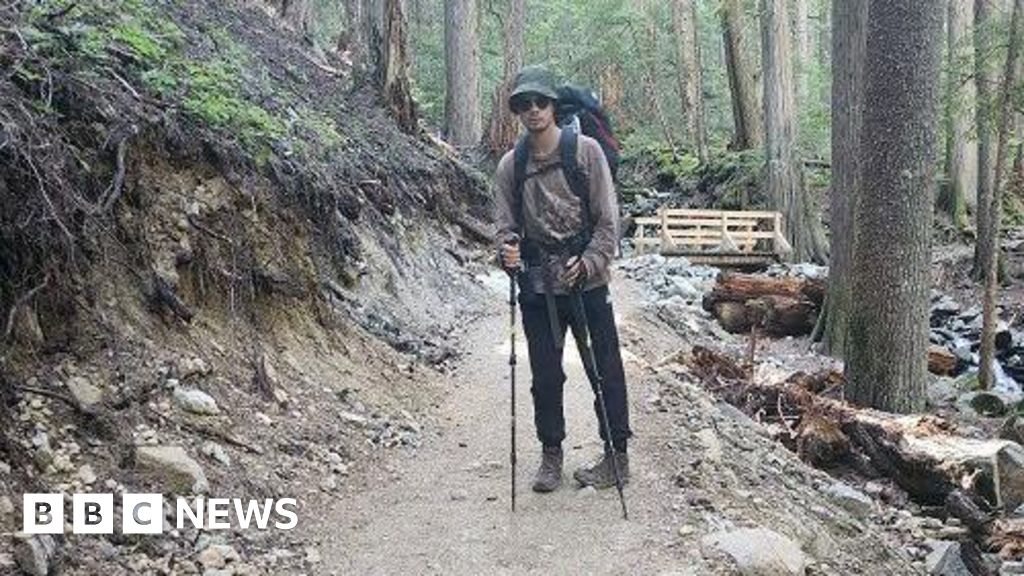
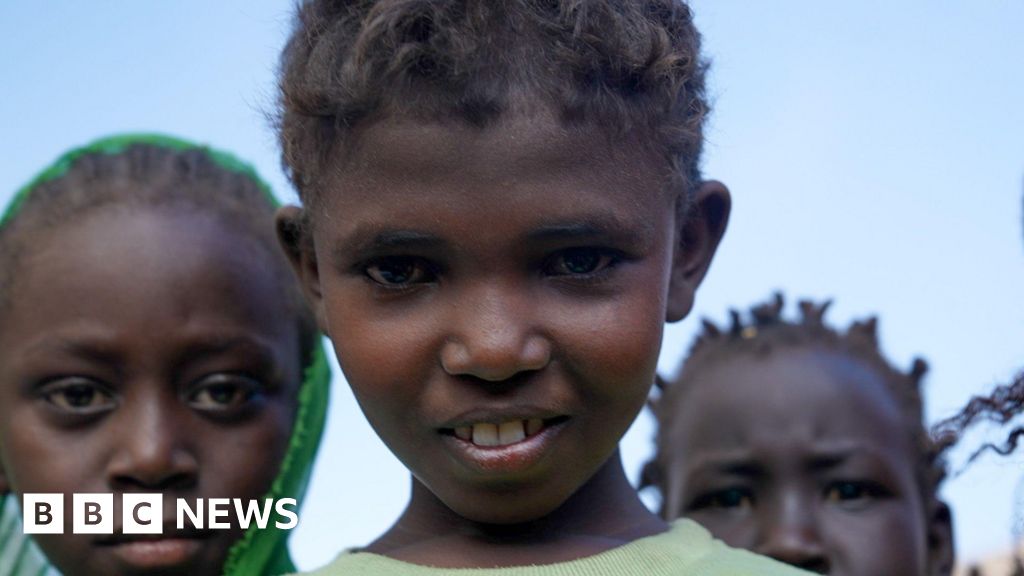
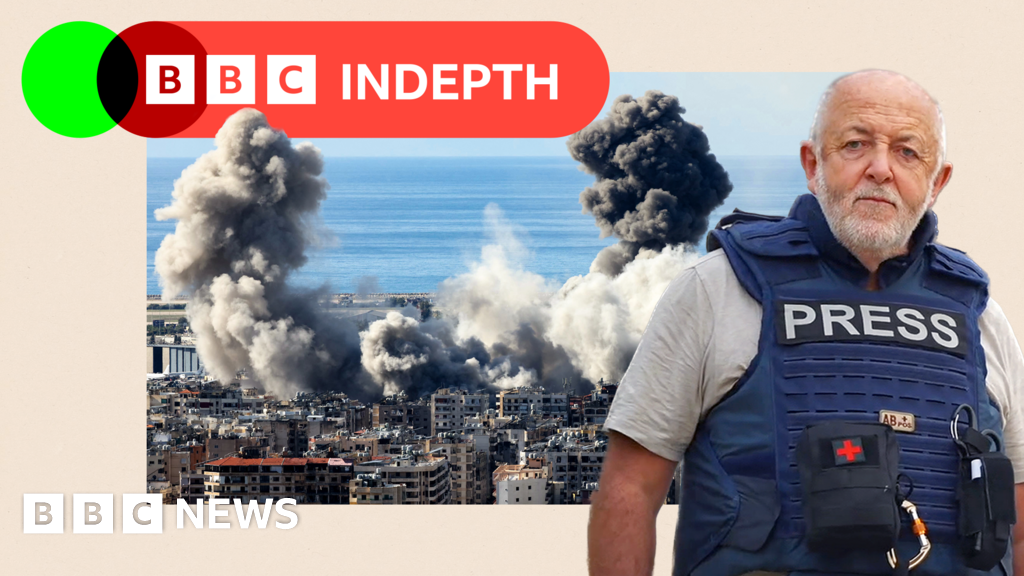
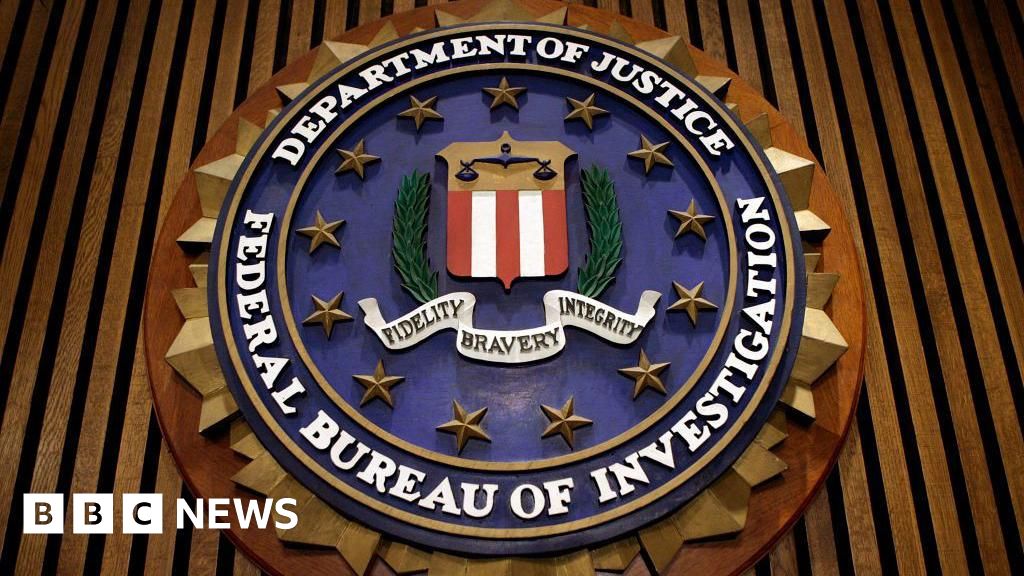





 English (US) ·
English (US) ·